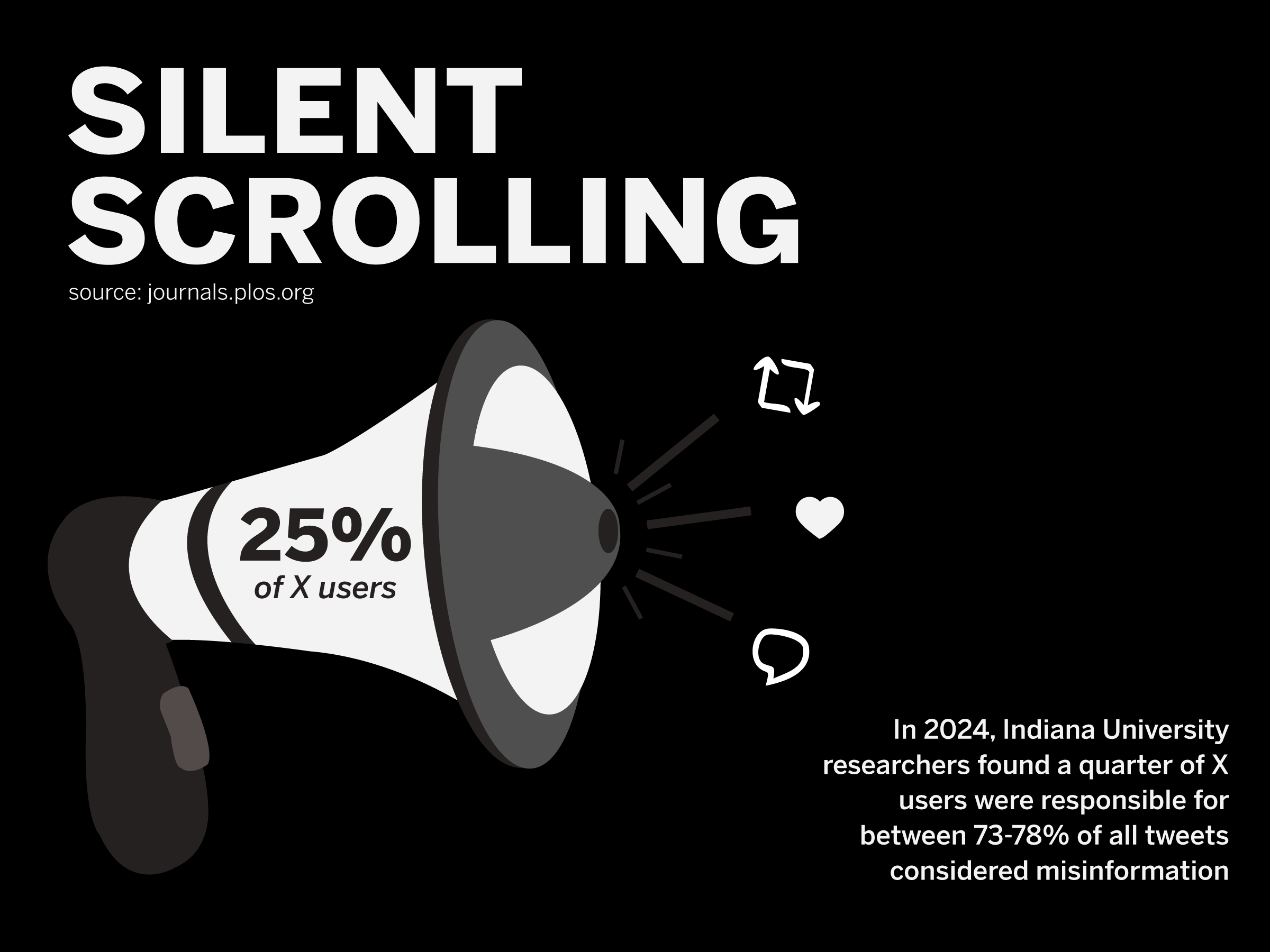Opinion: Social media activism fuels echo chambers, ineffective advocacy

Social media’s proved an influential tool for activists, but our columnist argues in recent years, the universal need to share opinions online has erupted. Accurate and mindful content must be the standard, not reactionary posting. Emma Lee | Contributing Illustrator
Get the latest Syracuse news delivered right to your inbox.
Subscribe to our newsletter here.
My recent scrolls through Instagram and TikTok have shown a deviation from their usual carefree, superficial content. Instead, I open the apps to an influx of political messaging consisting of bubble-letter infographics, shocking headlines and reposts from politicians.
Though likely well-intended, posting on social media is a flawed and ineffective cop-out for tangible change. It detracts from the potential advantages of awareness raised by social media’s algorithm.
Especially following shocking political events like the Charlie Kirk shooting and calls to release the Epstein files, social media has been filled with edited images, strong accusations and, as a result, strong polarization.
When celebrities shied away from speaking about the Israel-Palestine conflict, an online movement titled “Blockout Tuesday” was spurred, contrasting the lavish Met Gala with the realities of the conflict. Influencers and celebrities lost thousands of followers, and many claimed they weren’t educated enough on the topic to properly advocate.
Everyone wants to be an activist, but their version of demanding change doesn’t yield much result.
This trend is nothing new.
When Charli D’Amelio removed her 2020 profile picture in support of the Black Lives Matter movement, the internet quickly blazed with hate for the then-18-year-old influencer. While D’Amelio was one of countless other influencers who changed profile photos, she was accused of offering support only for the sake of a trend, her image and monetary gain.
The image, while advocating for a relevant cause, stood in stark contrast to her usual lighthearted dances and videos with friends and didn’t really prove a point.
Still, the bind presented by these continuous examples of backlash makes me question the value of the new philosophy that anyone can, and should, be an activist in the digital age.
Expecting influencers and casual content creators to use their platforms to speak on complex political issues dilutes the meaning of these issues to fleeting trend cycles and pushes viewers toward polarizing bubbles wrought with misinformation.
The National Library of Health explains the phenomenon of information cascades, in which people observe and replicate others’ ideas. As of 2024, the United Nations announced that two-thirds of digital creators don’t check the accuracy of their content.
On social media, this means that people quickly repost content without conducting their own research or checking sources. In the context of activism, people can misconstrue events on social media to push desired viewpoints.
The 2024 election, for example, saw a surge of AI deepfakes fooling voters to avoid the primaries, creating false celebrity endorsements or villainous depictions of candidates. The ability to quickly create and spread independent political messaging risks deeply disrupting democratic practices.
By nature, social media algorithms are designed to cater to a user’s individual interests, political beliefs and lifestyle. Social media’s algorithm, though, can be limiting and even radical when it comes to activism.

Sophia Burke | Digital Design Director
Users are exposed to similar content over and over again, leading to the formation of echochambers. A lack of exposure to alternative perspectives prevents bipartisan discourse and increases societal polarization, causing repeated messages to become internalized as beliefs.
For example, platforms such as YouTube, despite policies against hateful content, nudge viewers toward gradually more radical messaging. There’s a natural incentive for companies to promote such content – “clickbait” and “ragebait” are attractive to a casual scroller, increasing content consumption and profits for companies.
Aside from polarization, information cascades also cause activism on social media to be subject to the same fleeting trend cycles as the latest thing in fashion or the newest beauty hack. In the wake of particularly newsworthy events, people rush to social media to share their thoughts for validation only for the event to quickly fade into the background.
The phenomenon of “compassion fatigue” bombards the average user with exposure to tragedy, causing them to quickly tire of activist content, making online movements enthusiastic but short-lived. The result is actionless; people turn away from protests and tangible change, satisfied by quick, superficial online posts.
The ease of quickly posting online, combined with cascades of information, creates implicit pressure for people in various political bubbles to post about issues they aren’t informed or passionate about. Activism then becomes a mechanism for social acceptance – a way to conform with a crowd or boost personal perception.
Nowadays, the resurfacing of problematic content made by influencers who spoke out in favor of racial equality in 2020 has become all too common. And this isn’t just a problem for TikTok stars. Delta Airlines ran a 2024 “Pride Makes a Difference” social media campaign and was discovered to have donated over 300,000 dollars to anti-LGBTQ+ legislators.
Cases like this show how social media activism detracts from effective movements and doesn’t hold any true meaning. It’s far too easy for people and companies to dupe people into supporting them, only to use resulting profits against the cause.
People are often well-intentioned in posting for the causes they believe in. Regardless, online misinformation and radical media cause the internet to be a feeble cop-out for, and active harm to, true activism. The fact of the matter is that the sheer volume of half-hearted activism on social media causes genuine and impactful content to be swept up in the storm.
Social media could be a far more powerful tool for activists if we abandon the belief that everyone should promote typically false data and flashy headlines to include themselves in large political events. With properly fact-checked, researched content from qualified creators, we have the potential for a far less divisive, more informed society.
Varsha Sripadham is a freshman majoring in journalism and law, society and policy. She can be reached at vsripadh@syr.edu.





